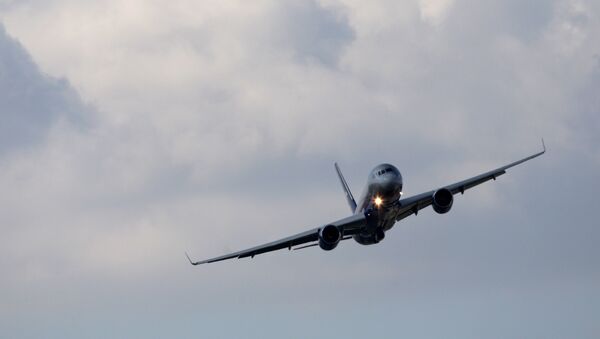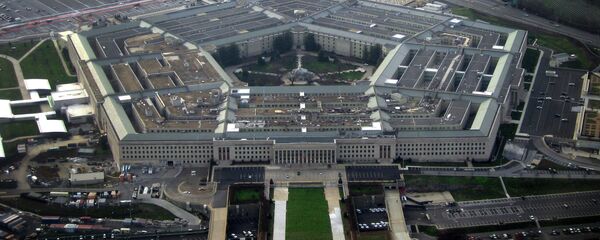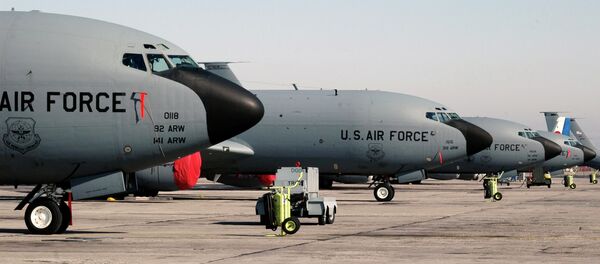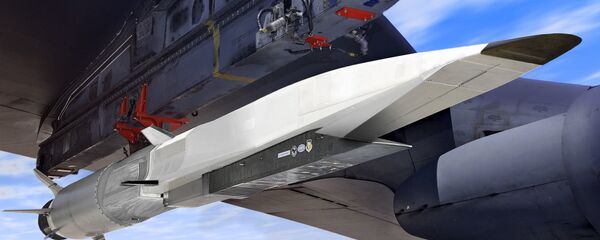The bill funds the Department of Defense as well as funding to accelerate US efforts to field a conventional prompt strike capability before 2022, $6.3 billion for the European Deterrence Initiative (EDI), and will obligate Defense Secretary James Mattis to submit a plan to Congress that would stop Turkey from getting F-35 aircraft if it purchases the Russian S-400 air defense system.
The 2019 NDAA also authorizes lethal defensive assistance to Ukraine while urging the need for reforms in the country.
"[The bill authorizes] support robust security sector assistance for Ukraine, including defensive lethal assistance, while promoting necessary reforms of the defense institutions of Ukraine," the text of the 2019 NDAA, signed into law by President Donald Trump on Monday, revealed.
The funds President Donald Trump requested for Ukraine include $250 million for lethal defensive items, the NDAA said. The bill introduces funds for Ukraine under the category of measures to counter Russia's military aggression.
The legislation also authorizes extra support for Georgia while the country is exploring an opportunity to become a member of NATO. Under the NDAA for 2019, the United States aims to increase the frequency and scale of military drills in the Black Sea in collaboration with Ukraine and Georgia.
"Not later than January 15, 2019, the President shall submit to the appropriate congressional committees a determination whether — (1) the Russian federation is in material breach of its obligations under the INF Treaty; and (2) the prohibitions set forth in Article VI of the INF Treaty remain binding on the United States as a matter of United States law," the NDAA said.
In addition, the United States will discuss with Russia if the latter’s new strategic weapon systems are in compliance with the New Strategic Arms Reduction (START) Treaty.
"Not later than December 31, 2018, the President shall… submit to the appropriate congressional committees a report as to whether… the President has raised the issue of covered Russian systems in the appropriate fora with the Russian Federation under Article V of the New START Treaty or otherwise," the legislation said.
Trump must report if Russia will agree to declare the covered systems as strategic offensive arms or otherwise pursuant to the New START Treaty, the legislation said.
The White House will notify the appropriate congressional committees as to whether the position of Russia threatens the viability of the New START Treaty or requires appropriate US political, economic or military responses, the legislation also said.
Moreover, the 2019 US National Defense Authorization Act revealed that Trump must present to Congress within 90 days a report on persons involved in transactions with Russia’s intelligence or military sectors.
The NDAA also requires the US President to update such a report every 90 days following the first submission for the next five years.
Meanwhile, the bill also reinforces US partnership with Israel and authorizes co-production of missile defense systems as well as enhances US support for European partners against Russia by funding the European Deterrence Initiative.
Particularly, the Department of Defense must submit a report to Congress by next March on the feasibility of permanent deployment of US troops in Poland.
"Not later than March 1, 2019, the Secretary of Defense, in coordination with the Secretary of State, shall submit to the congressional defense committees a report on the feasibility and advisability of permanently stationing United States forces in the Republic of Poland," the document said.
The NDAA also explained that an assessment of the permanent deployment feasibility should include an evaluation whether a US permanent deployment would increase deterrence against Russian as well as an assessment of Russia’s possible response.
In addition, the report should consist of an "assessment of the international political considerations of permanently stationing such a brigade combat team in Poland, including within the North Atlantic Treaty Organization (NATO)," the NDAA said.
Notably, the United States will also accelerate its hypersonic missile defense program and provide a report within 90 days to congressional defense committees.
The NDAA requires head of the Missile Defense Agency to "deploy such program in conjunction with a persistent space-based missile defense sensor program."
NDAA provides 90 days for Missile Defense Agency to submit a report on the hypersonic missile defense program to the US Senate and House of Representatives defense committees.
The report, which may include classified annex along with unclassified content, should provide an estimate of the cost, technical requirements and acquisition plan, the NDAA said.
US Halts Funding of Open Skies Treaty Enforcement With Russia
The United States will not obligate any funds to implement the Open Skies Treaty until penalties are imposed against Russia for previous violations, the 2019 NDAA revealed.
"None of the funds authorized to be appropriated by this Act… may be obligated or expended to carry out any activities to modify any United States aircraft for purposes of implementing the Open Skies Treaty," the legislation said on Monday.
The suspension is in place until the president certifies to Congress that penalties have been imposed on Russia for previous treaty violations, the document said.
The Russian Foreign Ministry has said it has complied with its obligations under all international agreements including the Open Skies Treaty
The Treaty on Open Skies was signed in 1992 and became one of the measures to build confidence in post-Cold War Europe. It has been operating since 2002 and allows participating countries to openly collect information on each other's military forces and activities.
The treaty covers most NATO member states as well as Russia, Belarus, Ukraine, Georgia, Bosnia and Herzegovina, Sweden and Finland. As a rule, flights of Russia and NATO member states are conducted on a reciprocal basis.
US Extends Ban on Bilateral Military Cooperation With Russia
The NDAA also revealed that the US government extended its ban against cooperating militarily with Russia in a bilateral format.
The prohibition remained in effect this year and with the law signed by Trump continues the ban through 2019.
The prohibition, first enacted in the 2017 NDAA, says none of the funds authorized may be used for any bilateral military-to-military cooperation with Russia until Moscow implements the Minsk accords and returns Crimea to Ukrainian sovereignty.
"Nothing in subsection (a) shall be construed to limit bilateral military-to-military dialogue between the United States and the Russian Federation for the purpose of reducing the risk of conflict," the 2019 NDAA stated.
The US and Russian militaries currently maintain a deconfliction line to avoid confrontations during operations in the Middle East.










